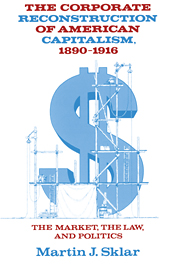Book contents
- Frontmatter
- Contents
- Preface
- List of abbreviations used in the footnotes
- 1 Introduction: Corporate capitalism and corporate liberalism
- Part I The market and the law
- Part II Politics
- 4 The politics of antitrust
- 5 Two progressive presidents
- 6 Woodrow Wilson and the corporate-liberal ascendancy
- 7 Conclusion: Fathers and prophets
- Bibliography
- Index
7 - Conclusion: Fathers and prophets
Published online by Cambridge University Press: 06 July 2010
- Frontmatter
- Contents
- Preface
- List of abbreviations used in the footnotes
- 1 Introduction: Corporate capitalism and corporate liberalism
- Part I The market and the law
- Part II Politics
- 4 The politics of antitrust
- 5 Two progressive presidents
- 6 Woodrow Wilson and the corporate-liberal ascendancy
- 7 Conclusion: Fathers and prophets
- Bibliography
- Index
Summary
Practically the whole of our industrial and economic mechanism has been reconstructed within the past few years.
– Henry Clews, 1905They were making the first tentative combinations of the ideas and materials they found ready at their hands – ideas destined to become, in future years, first articulate, then startling and finally commonplace. At the moment … they were sitting with disarming quiet upon the still unhatched eggs of the mid-twentieth century.
– F. Scott Fitzgerald, “The Scandal Detectives,” Taps at ReveilleThe transformation of capitalist market and property relations, along with the rise of new thinking about those relations and their implications for public policy, gave to the period of 1890–1916 its distinctive character in American history. The property-production system, or the mode of production, passed from the proprietary-competitive stage to the incipient phase of the corporate-administered stage of capitalism.
The transformation of the market and of the form of capitalist property included changes in the organization and management of labor, production processes, finance, distribution, and administration. These changes generated new professional, technical, and managerial functions with their corresponding social strata and, in turn, their values, attitudes, and ideological dispositions. Along with these strata came provision for their training and for the propagation of forms of consciousness appropriate to their functions, provision especially lodged in newly established or reoriented university professional and graduate schools and professional associations. The new market and property relations also generated movements for the alteration of government roles in social and economic affairs, that is, new governmental functions and administrative structures.
- Type
- Chapter
- Information
- The Corporate Reconstruction of American Capitalism, 1890–1916The Market, the Law, and Politics, pp. 431 - 441Publisher: Cambridge University PressPrint publication year: 1988

